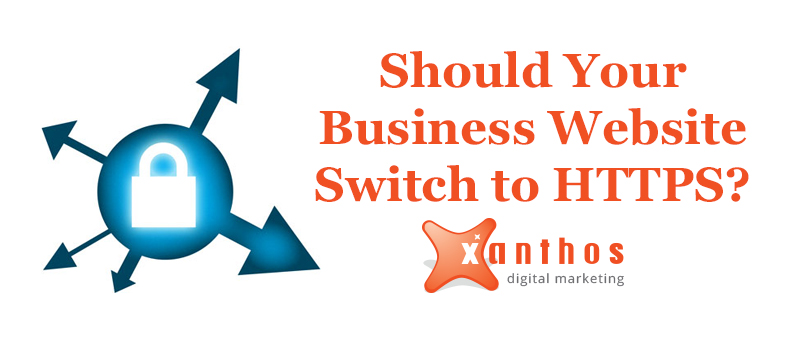Google has now adopted HTTPS as a Ranking Signal, meaning sites which adopt it will gain higher rankings in search results. So what does this mean for your business, and what should your next move be?
Google recently announced that HTTPS is now a ranking signal over on the Webmaster Blog. Google has seen positive results from experimenting with “taking into account whether sites use secure, encrypted connections as a signal in our search ranking algorithms” over the past few months.
What is HTTPS?
HTTPS prevents wire-tapping, or any other third-party intrusions on data transfer between websites and users. Most websites use HTTPS on checkouts, and other pages which require secure transmissions, but Google is looking to promote HTTPS everywhere. In more basic terms, any website you’ve visited with a padlock is making use of HTTPS to ensure secure data transmission.

Why is Google boosting HTTPS Ranking Signals?
In giving sites using HTTPS preference in search engine results, they are hoping for all websites to become more secure, and thus a safer experience for users of Google, and the internet at large.
With such a deep penetration of the search engine market, accounting for over 89% of the UK Search Engine Market Share, Google know they have a significant influence over the way the internet is shaped, and is looking to create a secure online environment. And because Google is an unparalleled online behemoth, all webmasters must pay attention to what they’re up to.
At the Google I/O developers’ conference, Ilya Grigorik highlighted why HTTPS matters. For a more in-depth explanation, watch his speech below.

What am I supposed to do?
Of course, Google hasn’t left us stranded without any form of advice on what to do next. Google gives the following information in order to make the HTTPS transition correctly:
- Decide the kind of certificate you need: single, multi-domain, or wildcard certificate
- Use 2048-bit key certificates
- Use relative URLs for resources that reside on the same secure domain
- Use protocol relative URLs for all other domains
- Don’t block your HTTPS site from crawling using robots.txt
- Allow indexing of your pages by search engines where possible. Avoid the noindex robots meta tag.
You can also check the security of your HTTPS site with the Qualys Lab Tool.
How will the HTTPS Ranking Signal impact my business?
For the moment, the ranking signal isn’t incredibly important, as it is a lightweight signal which will affect “fewer than 1% of global queries and carries less weight than other signals such as high-quality content.” Google have said that the SSL ranking signal is equated with the Panda signal, but that the HTTPS ranking signal may be strengthened over time.
It’s weak for now, in order for webmasters to have time to make the switch to HTTPS. But with Google attempting to make HTTPS a new internet standard, the ranking signal is sure to gain strength over time.

How will switching to HTTPS affect my business?
There are a number of factors to take into consideration when you finally decide to make the site move to HTTPS as it’s not a decision to take lightly.
- HTTPS on all webpages – not just checkouts
Most websites make use of HTTPS on checkout pages, and other pages that need to be secure. But with this change all pages on your site will need to be secure.
- Redirecting traffic from HTTP to your HTTPS site
As Google considers HTTP and HTTPS as separate entities, it means you will have to use 301 redirects to direct links from your HTTP pages to the new HTTPS versions. With 301 redirects indicating your site has permanently moved to the new domain, your inbound links or “link juice” may lose some power as an SEO factor. This may mean your page ranking and authority is affected, resulting in a loss of traffic; although it is difficult to say how much. It will only be a small change, but if you’re a small business, this could be a more significant consideration.
- Are your site assets secure?
Any assets, whether images, videos, and third party assets, will need to be entirely secure. This could cause problems, so this will need to be assessed, alongside any problems which absolute URLs could cause.
- SSL Certificate Fees
If you haven’t already got one on your current website, then you will need to take this expense into account.
- Slower Loading Speeds
HTTPS means slowing webpage loading times. And as the loading speed is a ranking factor in itself, it seems contradictory. However, the good news is that the difference is relatively insignificant, and so it’s essential the web design is done properly to reduce the time it takes to load.
- Signal affecting only 1% of user queries
There is nothing to say you will be directly affected or not, and so you may not witness a change in ranking just yet if you decide to jump to HTTPS.
What Should My Business Do?
Short Term Plans
To put it bluntly, in the short term, do nothing. As the ranking signal is relatively weak, you’re not going to see a drastic change in traffic.
The best thing to do at this stage, is start planning ahead for your switch to a fully secured HTTPS website. Look to the future, keep your ear to the ground, and formulate a strategy for your company’s move to HTTPS.
Long Term Plans
Your long term plan should be to switch to HTTPS, that much is clear. Despite the move creating a few small problems, including an initial loss in ranking authority, the future long term gains of the move should counteract this.
However, it can be relatively easy to make a slip when changing to HTTPS and ruin your website SEO, without it directly having anything to do with the migration. This is why it is essential to take your time in making the move, and ensuring everything is done correctly.
If you’re looking to launch a website on a new domain, then it makes sense to launch on HTTPS, as there is no danger of losing already accredited backlinks, and other SEO factors.
Switching to HTTPS isn’t going to get you to the top of Google overnight, and is one factor among many. Yet this is something that could become a vital part of ranking in the near-future, and if the web adopts HTTPS as standard, then you could find your business losing out if you don’t plan for the future.
In summary, you need to ensure you have a plan in place to switch to HTTPS, as it could be an invaluable SEO factor, alongside bolstering your website security. We believe that with the increase in Cyber Crime, a future standard of HTTPS adoption is a great move for webmasters to make.
Whether you’re looking to transition your business website to HTTPS, starting afresh with a new site or domain, or would like further information or advice, then please do get in touch. We would love to help you.











